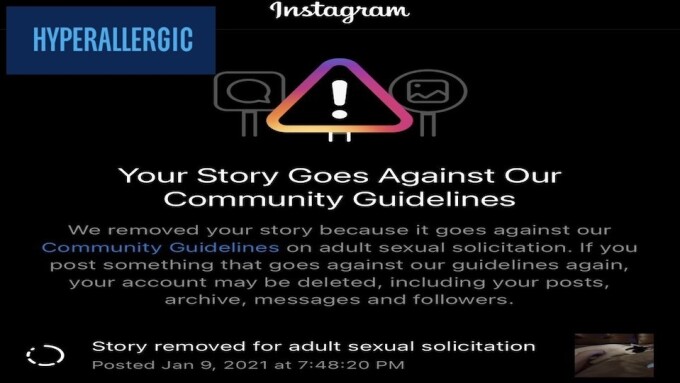NEW YORK — Prominent art news site Hyperallergic has published an essay targeting Instagram's controversial practice of censoring sexual content by inaccurately labeling posts as “sexual solicitation.”
Titled “Why Does Instagram Think My Artwork is Soliciting Sex?” the April opinion piece was penned by Emma Shapiro, an American visual artist living in Spain.
According to the publication, Instagram’s new “sexual solicitation” notification, which has been abundantly deployed against adult performers and sex workers since its inception, is now being used by the Meta-owned company against supposedly “sexual” material in a misguided purge that “is not only wrong, it’s also offensive.”
“I am unfortunately accustomed to my artwork being removed from Instagram for ‘nudity,’ despite Meta’s explicit allowance for nudity in art,” Shapiro wrote. “Instagram’s lack of nuance in how the ‘nudity’ guidelines are applied to art is a long-standing concern for many artists, but this new ‘sexual solicitation’ notification was not only wrong, it is also offensive. This was no simple misreading of an image’s artistic merits, but an accusation and an overt sexualization of my artwork and my body.”
Hyperallergic included evidence of post removal notifications from well-known artists Robert Andy Coombs, Paz Bernstein, Savannah Spirit, Tiffany Cole and the Exposure Therapy Project which corroborate the reports by adult performers and sex workers over the bogus label.
For Shapiro, the explanation for Instagram’s baseless accusation is simple: FOSTA/SESTA.
“The claim of ‘sexual solicitation’ is not just a misunderstanding,” she wrote, “it is linked to sweeping changes to our legal landscape. In April 2018, Stop Enabling Sex Traffickers Act and Fight Online Sex Trafficking Act [SESTA/FOSTA] was signed into law, modifying Section 230 of the Communications Decency Act to remove websites’ immunity from crimes related to sex trafficking and child sex abuse imagery.”
Explaining how SESTA/FOSTA carved out a censorship exception to the “safe harbor” rule set up by Section 230, Shapiro also noted that the law — repudiated by virtually all sex worker rights, adult industry and digital rights groups — was passed “under the guise of protecting children and inhibiting sex trafficking online, but in practice it has actually had a negative impact on the communities it purports to protect.”
To comply with SESTA/FOSTA, Shapiro added, “Meta often assumes that content including the naked body is sexual and therefore in violation, which is a faulty line of logic as Dr. Carolina Are points out in ‘The Shadowban Cycle,’ as it ‘conflate[s] sex trafficking with sex, sex with a lack of safety and lack of safety with women’s bodies.’”
“I feel that my art and all its intricate communications has been reduced to sex,” artist Cole told Shapiro. “What these deletions are saying to artists is that a representation of the female form cannot be anything other than a solicitation of sex.”
To read Emma Shapiro’s “Why Does Instagram Think My Artwork is Soliciting Sex?” visit Hyperallergic.com.








